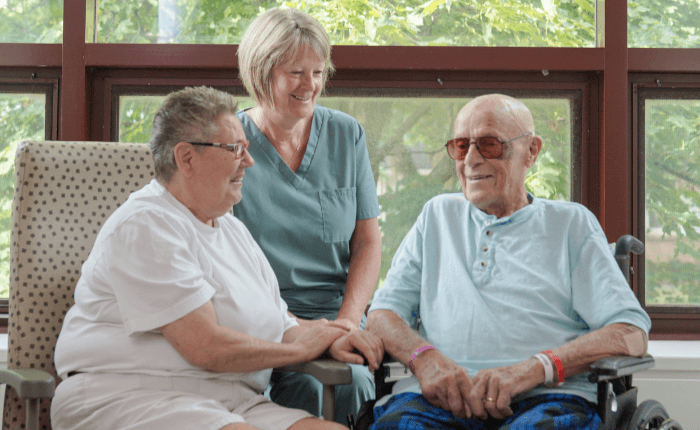Our Rooms

Most of our rooms have either two or four beds and space is limited. Bed assignments are made based on care needs and availability. Room changes may be necessary during your stay to ensure we are providing the right care to the right patients in the right setting. You may share a room with males or females depending on who is being admitted to the unit.
Concerns about bed assignments should be directed to the manager. Each bed area has a bed, nightstand, over bed table, chair, closet and room for assistive devices such as a wheelchair or walker.
Television and Phone Service
Available and free (STEGH Hospital Foundation generously provides service); however, some applications on the television must be logged into an existing personal account to be used (i.e. a service that requires a membership fee). The televisions have many functions available to you in addition to just television channels – they are considered to be an “entertainment centre.”
Your phone extension is on the white board at your bedside. Feel free to provide this to family/friends so they can contact you directly.
Communication Board
Each patient has a communication board at their bedside. We often refer to these as your “white board.” The purpose of the communication board is to share information about your health care team, your goals, discharge destination and other information you will need during your stay. The second purpose of the white board is for your health care team to have information available to them about you and how they can provide safe care.
What is a Complex Care Bed?
We are committed to compassion and excellence in the provision of complex care services. We strive to meet the physical, emotional, social and spiritual needs of each person. We believe in treating each person with dignity, respect and compassion, reflecting STEGH hospital values.
Am I eligible for a Complex Care bed?
An application process is required to access our Complex Care services. If you are a candidate for our program your health care team will make a referral to Co-Ordinated Access through Home and Community Care Support Services. They will review the application, confirm eligibility and place your name on a list for admission to Complex Care when a bed becomes available. Complex Care is located in the South Building on the First floor.
What are the different types of Complex Care beds?
- Activation/restoration - with a functional goal of progression to increase and strengthen independence. This in the past was often referred to as “slow stream rehab” because it is low intensity for a longer period of time.
- Short Term Medical Management – with a functional goal of stabilization and progression to help avoid further loss of function, increase activity tolerance and progress
- Long-term Medical Management – with a functional goal of maintenance over an extended period of time to maintain and/or slow the rate of or avoid further loss of function
- End of Life Care – often referred to as “chronic palliative” these patients often come to a complex care bed for the remainder of their end of life journey. Patients may also ask for a referral to a local hospice, once they meet the criteria for admission to a hospice. Home and Community Care Support Services will assist and support you through this process.
- Behavioural Health – looks at everyday behaviours and how they influence both physical and mental well-being. The patient may have responsive behaviours or other challenges that make it difficult for them to be placed in long-term care. It considers things like: reactions, habits, lifestyle, social interactions, cultural practices, and copings strategies. The goal is to assess the behaviours and implement strategies that help to manage these through the input of an interdisciplinary team. Complex Care has a wander guard system that ensures the safety of those patients that wander or exit seek.
- Alternate Level of Care (ALC) to Long-Term Care – there are a small number of ALC-LTC beds available for patients who cannot return to their previous living environment and because of their health care needs may have to stay in hospital until a bed becomes available in long-term care. If you are eligible for one of these beds the hospital social worker will talk to you about what is referred to as the ALC Co-payment. The Ministry of Health expects that you will contribute towards the cost of your care while you remain in hospital waiting for a long-term care bed.
What is a Rehab Bed?
Rehabilitation is a treatment or treatments designed to facilitate the process of recovery from injury, illness or disease to as normal a condition as possible. The purpose of rehabilitation is to restore some or all of the patient’s physical, sensory and mental capabilities that were lost due to injury, illness or disease. Care is planned and delivered based on goals identified and set in collaboration with the multidisciplinary health care team, patient and their family.
Am I eligible for a rehabilitation bed?
An application process is required to access our rehabilitation program. If you are a candidate for our program your health care team will make a referral to Co-Ordinated Access through Home and Community Care Support Services. They will review the application, confirm eligibility and place your name on a list for admission to Rehabilitation Services when a bed becomes available. Rehab is a seven bed program located in the South Building on the First floor.
What is expected of me while in rehabilitation?
As part of the application process you would have completed a form that you signed committing to participating in rehabilitation, to being motivated and developing rehabilitation goals that maximize the benefit of these specialized services.



